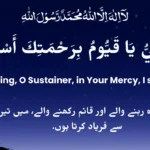Visiting a graveyard (Kabristan) is a significant act in Islam. It reminds believers of the realities of life and the Hereafter. When entering a Kabristan, reciting the prescribed Kabristan Ki Dua is recommended as per the Sunnah of Prophet Muhammad (PBUH). This dua offers peace to the deceased and reflects the humility of the visitor in seeking forgiveness and blessings for both the living and the dead.
| Jumma Mubarak Dua – Seek Blessings on Friday |
| Pani Peene Ki Dua – Dua for drinking water |
| Hasbi Allah dua | Allah Is Sufficient For Me |
| Dua for Wearning New Clothes with Translation |
The Dua for Visiting a Graveyard
Arabic Text
السَّلَامُ عَلَيْكُمْ أَهْلَ الدِّيَارِ مِنَ الْمُؤْمِنِينَ وَالْمُسْلِمِينَ، وَإِنَّا إِنْ شَاءَ اللَّهُ بِكُمْ لَاحِقُونَ، نَسْأَلُ اللَّهَ لَنَا وَلَكُمُ الْعَافِيَةَ
Transliteration
As-Salamu Alaikum Ahlad-Diyaar Min Al-Mu’mineena Wal-Muslimeen, Wa Inna In Shaa’ Allahu Bikum Lahiqun, Nas’alullaha Lana Walakumul ‘Afiyah.
English Translation
“Peace be upon you, O inhabitants of the graves, from among the believers and the Muslims. Indeed, we will, In Shaa Allah, join you. We ask Allah for well-being for us and for you.”
Urdu Translation
السلام علیکم اے قبر والوں جو مومنوں اور مسلمانوں میں سے ہیں۔ بیشک، ہم بھی ان شاء اللہ آپ کے ساتھ شامل ہوں گے۔ ہم اللہ سے اپنے لیے اور آپ کے لیے عافیت کی دعا کرتے ہیں۔
Explanation of kabristan mein dakhil hone ki dua
1. Salaam and Greeting to the Deceased
The dua begins with offering peace to the deceased:
- This shows respect and acknowledges their place in the Hereafter.
- It reinforces the bond of brotherhood among Muslims, both living and dead.
2. Acknowledgment of Life’s Temporary Nature
The phrase “Indeed, we will join you” serves as a reminder of the transient nature of life. It highlights:
- The inevitability of death.
- The importance of preparing for the Hereafter by performing righteous deeds.
3. A Prayer for Well-Being (Afiyah)
- The dua includes a prayer for well-being (Afiyah) for both the living and the deceased.
- Seeking Allah’s mercy is an act of humility and a reminder of His ultimate authority.
The Importance of Visiting Graves
- Reminder of the Afterlife
Visiting graves reminds Muslims of their mortality and the Day of Judgment. It encourages self-reflection and repentance. - Dua for the Deceased
Reciting the prescribed dua benefits the deceased, as it conveys blessings and peace upon them. - A Sunnah Act
The Prophet Muhammad (PBUH) encouraged Muslims to visit graves, saying it softens the heart and reminds one of the Hereafter.
Etiquettes of Visiting a Graveyard
- Maintain Silence: Avoid unnecessary conversations and distractions.
- Recite the Dua: Offer the prescribed dua upon entering the graveyard.
- Show Respect: Refrain from walking on graves or disrespecting the sanctity of the place.
- Avoid Shirk: Ensure prayers and invocations are directed solely to Allah.
- Make Specific Duas: Pray for forgiveness and mercy for the deceased.
Similar Duas for Different Occasions
Exploring related duas enhances one’s spiritual connection:
1. Dua for Entering a Graveyard (Shorter Version)
Arabic: السَّلَامُ عَلَيْكُمْ أَهْلَ الْقُبُورِ
Transliteration: As-Salamu Alaikum Ahlal-Quboor
Translation: “Peace be upon you, O dwellers of the graves.”
2. Dua for Seeking Forgiveness
Arabic: اَللّٰهُمَّ اغْفِرْ لَهُمْ وَارْحَمْهُمْ
Transliteration: Allahumma Ghfir Lahum Warhamhum
Translation: “O Allah, forgive them and have mercy upon them.”
Conclusion
Visiting kabristan mein dakhil hone ki dua is a profound spiritual act that fosters humility and connection with Allah. Reciting the Kabristan Ki Dua not only benefits the deceased but also serves as a reminder for the living about the transient nature of life. Following the etiquettes and engaging in sincere supplications ensure that this act of worship is carried out in the most respectful and meaningful way.
FAQs:
Reciting the dua brings peace to the deceased, reminds the visitor of the Hereafter, and encourages humility and self-reflection.
Yes, women can visit graveyards as long as they adhere to Islamic guidelines, maintain modesty, and avoid lamentation.
Afiyah refers to well-being, protection, and peace, which are sought for both the living and the deceased in this dua.





I’m really impressed along with your writing skills and also with the layout in your blog. Is that this a paid subject matter or did you customize it yourself? Either way stay up the excellent high quality writing, it is uncommon to see a nice weblog like this one nowadays!